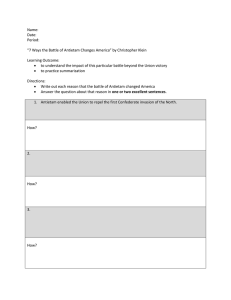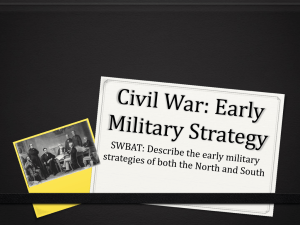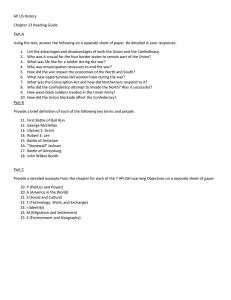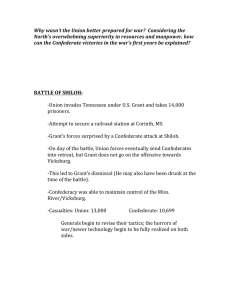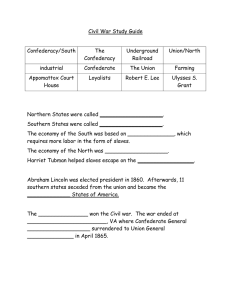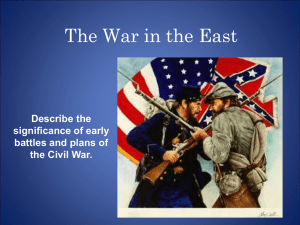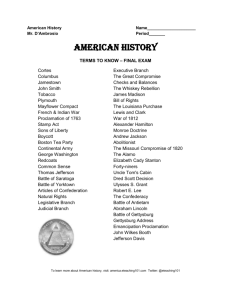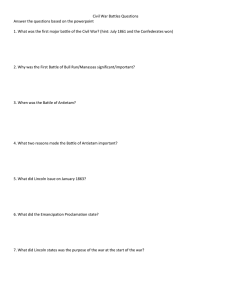Fighting Begins and Slavery Ends Unit 7, Lesson 2
advertisement
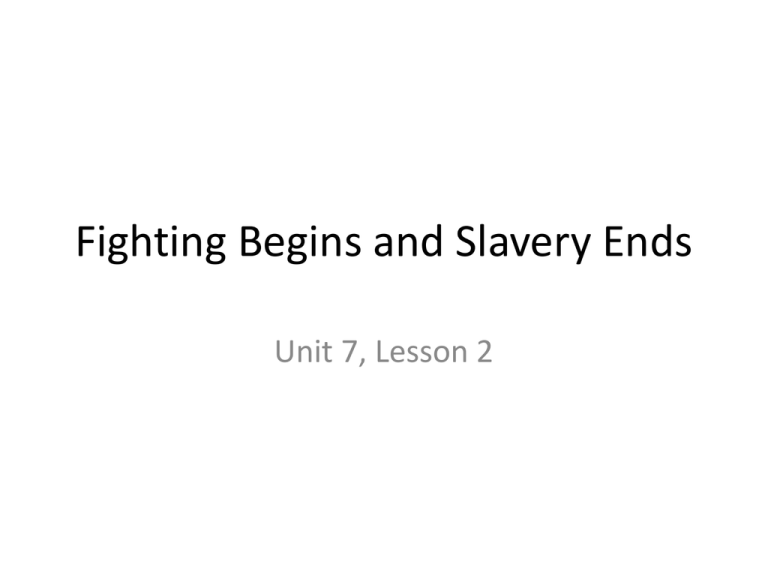
Fighting Begins and Slavery Ends Unit 7, Lesson 2 Essential Idea • Early battles set the tone for the Civil War and the Battle of Antietam was a major turning point that led to the Emancipation Proclamation. Two Main Theaters • Fighting Locations: • Most of the Civil War was fought in two main theaters (areas of fighting) • 1. Eastern Theater—eastern part of the country, mainly states close to Washington, D.C. and Richmond Two Main Theaters • 2. Western Theater—states close to the Mississippi River to the Carolinas The First Battle • • • • Event: Battle of Bull Run Location: Virginia (Eastern Theater) • Result: • Surprise Confederate victory Battle of Bull Run • Details: • The battle took place only 20 miles from Washington, D.C. • Civilians came out of the city to picnic and watch the battle • Northerners thought the South was too weak and the war would end quickly • At first, the Union easily won and many Confederates retreated Battle of Bull Run • General Thomas Jackson earned the nickname, “Stonewall,” when he and his men refused to retreat • Confederate reinforcements arrived, swinging momentum to the South • Union troops retreated in shocking defeat • Battle of Bull Run Battle of Bull Run • Significance: • New weapons showed the war would be deadlier than expected • The Confederate army was stronger than expected • The surprise Confederate victory showed the war would be longer and harder than expected • Bull Run Foreshadows a Long and Bloody War Battle of Shiloh • Event: • Battle of Shiloh • Location: • Tennessee (Western Theater) • Result: • Union victory Battle of Shiloh • Details: • Like the coast and Mississippi River, the South’s (few) railroads were vital to southern trade • Union General Ulysses S. Grant (and William Sherman) planned to cut railroads in Mississippi to divide the Confederacy • On the way, Confederates ambushed the Union troops, who suffered terrible losses • Initial Losses Battle of Shiloh • Despite losses, Grant led troops into a second day of fighting • Union reinforcements arrived and secured Union victory • Northerners disliked Grant’s methods since they led to many casualties, even though he won • Lincoln liked Grant, saying “I can’t spare this man; he fights!” • Grant Wins Battle of Shiloh • Significance: • Grant was established as the best Union general in the Western Theater • Cutting railroads would be used in addition to the Anaconda Plan to divide the Confederacy Peninsula Campaign • • • • • • Event: The Peninsula Campaign Location: Virginia (Eastern Theater) Results: Confederate victory Peninsula Campaign • Details: • Union General George McClellan led troops toward Richmond • McClellan was slow and overly cautious in battle • Confederate General Robert E. Lee launched a series of attacks on McClellan’s troops (Seven Days Battle) • Lee inflicted heavy damage on the Union army and forced McClellan to retreat • The Peninsula Campaign Peninsula Campaign • Significance: • Richmond, the Confederate capital, was saved • Lee was established as the best Confederate general in the Eastern Theater • Lee felt bold enough to invade the Union through Maryland • Lee hoped invading the Union would turn northerners against the war and earn British aid Battle of Antietam • Event: • Battle of Antietam • Location: • Maryland (Eastern Theater) • Results: • Union victory Battle of Antietam • Details: • Lee’s invasion of Maryland was intercepted by McClellan • The battle was a draw, but Lee withdrew since he had fewer troops to spare • The battle was the bloodiest single day of the war (over 22,000 casualties) • Battle of Antietam (0:00-11:55) Battle of Antietam • Lee escaped and Lincoln fired McClellan for being too cautious • McClellan Fired (11:55-15:07) Battle of Antietam • Northerners were appalled by the carnage and their support for the war dropped further • Northern Morale Sinks After Antietam (15:07-17:32) Battle of Antietam • Significance: • Antietam made the Confederacy look weak, so England started withdrawing support • After Antietam, Lincoln needed to boost northern morale or lose support for the war Emancipation Proclamation • Lincoln’s Action: • Emancipation Proclamation • Details: • To boost northern morale, Lincoln issued the Emancipation Proclamation • The Emancipation Proclamation announced all slaves in REBELLING states to be free (not border states) Emancipation Proclamation • Significance: • The Unions’ purpose of the war was not just to preserve the Union anymore, but to also END SLAVERY • This set the precedent for the future 13th amendment, which abolished slavery EVERYWHERE • The Emancipation Proclamation Foreign Impact • Foreign Impact: • Britain had already abolished slavery • With the Union’s purpose including abolition, Britain decided NOT to help the Confederacy • This severely hurt the South’s chances for success Domestic Impact: North • Domestic Impact (North): • Northern support the war briefly rose since it had a moral cause • Eventually, emancipated slaves joined the Union army Domestic Impact: South • Domestic Impact (South): • Initially, no slaves were freed since Confederates did not recognize Lincoln’s authority • However, Union troops freed slaves as they invaded and others ran away more • The Confederacy’s economy, already suffering, crumbled as they lost slaves • The Confederacy could no longer count on British help Minority Groups in the Civil War: Women • 1. Women • Women maintained businesses, farms, and factories while the men fought as soldiers • Thousands cared for the wounded as battlefield nurses • Clara Barton—served as a nurse and later founded the American Red Cross Minority Groups in the Civil War: Blacks • 2. Blacks • Almost 200,000 blacks served in the Union military, many of them exslaves • They were segregated into allblack units and experienced discrimination • Freedmen Join the Union Military 54th Massachusetts • 54th Massachusetts —this black regiment (and others) fought bravely and successfully, helping earn respect from whites
